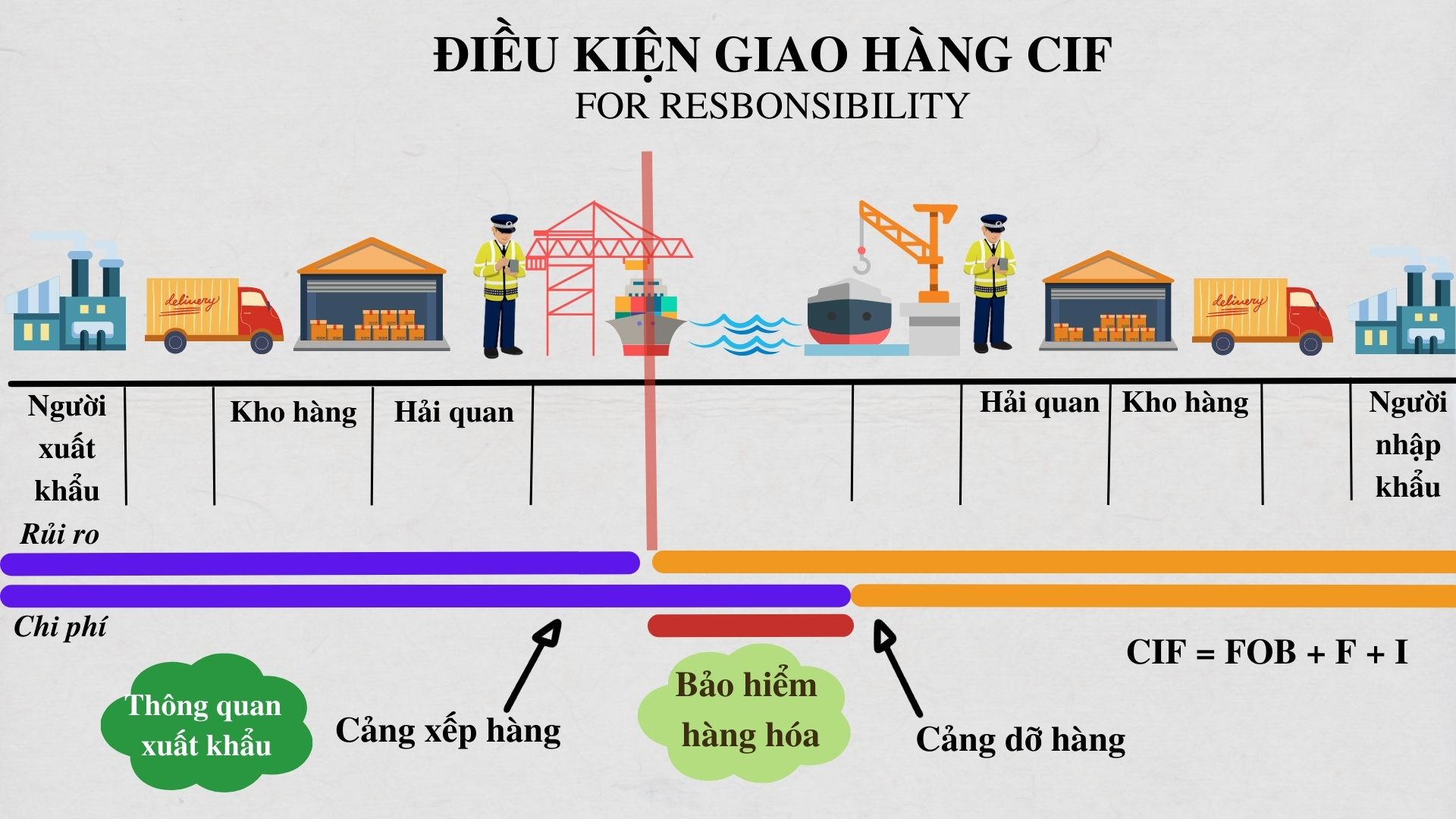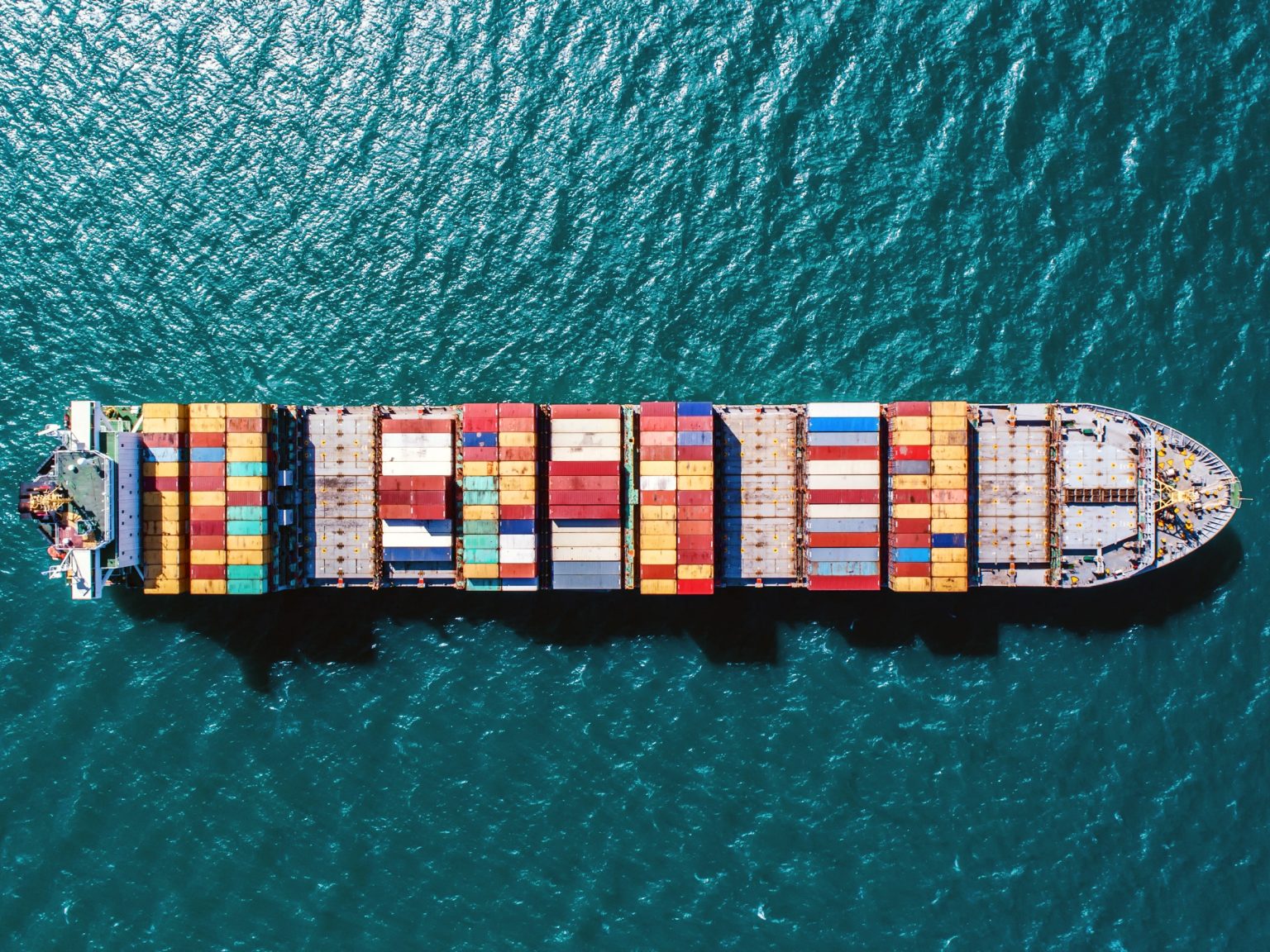Are you looking to understand more about delivery terms, how responsibilities, and costs are divided between the buyer and the seller under CIF terms? Distinguishing between FOB, CIF, CFR, etc.? In reality, CIF is an attractive option for those who want to reduce the burden of transportation, insurance, and other related costs during the shipment process from the departure port to the destination port in the receiving country. Let's learn more about CIF delivery terms and the benefits they can bring to your business through the article below.
CIF Delivery Terms
CIF (Cost, Insurance, and Freight) is a term in international trade that describes a type of sales contract for goods. Under CIF terms, the seller is responsible for shipping the goods to the port of destination specified by the buyer. The seller must also purchase insurance for the goods until they are delivered to the buyer at the destination port.

Under CIF terms, the seller is responsible for ensuring the safe transport of the goods and insuring the goods during transit. The seller must bear the shipping and insurance costs for the goods to the destination port. However, once the goods are delivered at the destination port, the responsibility and related costs of the goods shift to the buyer.
The buyer is responsible for customs procedures, import costs, and transporting the goods from the port to the final destination. The buyer also bears the risk related to the goods after they have been delivered to the destination port.
Importantly, CIF terms only apply to sea or river transport. If delivery is made by other means such as air or road, other terms like CIP (Carriage and Insurance Paid to) or DAP (Delivered at Place) may be applied.
When Should You Choose CIF Delivery Terms?
CIF is often considered a favorable term for small and medium-sized enterprises, as well as businesses new to international trade with a relatively small volume of goods. In this term, the buyer’s responsibility for the goods is higher than the seller’s, but in terms of cost, the buyer will bear less since the seller has already covered the costs related to shipping the goods to the buyer’s country.
However, it should be noted that purchasing CIF may increase costs for the buyer because the seller directly works with the carrier and may set higher prices to earn additional profit. Furthermore, with a larger volume of goods, the buyer may face difficulties in controlling the goods. Once the goods are loaded onto the ship, the seller is no longer responsible for them, so if any issues arise during transportation, the seller may not be able to handle them promptly, and the information might be delayed to the buyer due to intermediary parties.
Therefore, when deciding to buy CIF, the buyer needs to carefully consider and evaluate factors such as cost, the ability to control goods, and risk management. If the volume of goods is small and the ability to control is good, CIF can be a reasonable choice. However, when the volume of goods is large and requires high control, the buyer may need to consider other delivery terms like FOB or CFR.
Responsibilities of the Parties Under CIF Terms
The responsibilities of the seller and buyer in the delivery process under CIF (Cost, Insurance, and Freight) terms are as follows:
What Responsibilities Does the Seller Have?
Providing Goods: The seller must provide the goods as stipulated in the sales contract. The goods must meet the requirements for quantity, quality, packaging, and comply with export regulations.

- Transporting the Goods: The seller is responsible for transporting the goods from their place of production or warehouse to the export port specified in the contract. The seller must arrange and pay for the transportation costs of the goods to the export port.
- Insuring the Goods: The seller must purchase insurance for the goods until they pass over the ship's rail at the export port. This insurance protects the goods from loss or damage during transit.
- Providing Documentation: The seller must provide the buyer with the relevant documentation related to the goods and transport, including the shipping invoice, goods invoice, transport documents, and insurance documents.
What Responsibilities Does the Buyer Have?
- Paying for the Goods: The buyer must pay for the goods as agreed in the sales contract. The timing and method of payment are specified in the contract.
- Managing Import: The buyer is responsible for importing the goods and related customs procedures. This includes arranging and paying for fees, taxes, import duties, and complying with customs regulations.
- Transporting the Goods: The buyer is responsible for transporting the goods from the import port to the final destination specified in the contract. The buyer must arrange and pay for the transportation costs of the goods from the import port.
- Costs and Risks After the Goods Pass Over the Ship's Rail: The buyer is responsible for costs and risks after the goods pass over the ship's rail at the export port. This includes responsibility for storage, domestic transport, and insuring the goods from the export port to the final destination.
Distinguishing Between FOB, CIF, CFR Delivery Terms
FOB (Free On Board), CIF (Cost, Insurance, and Freight), and CFR (Cost and Freight) are common delivery terms in international trade. Below is a distinction between the three terms:
FOB (Free On Board)
Under FOB terms, the seller is responsible for transporting the goods to the export port (Port of Shipment) and bearing the shipping costs to this port. Once the goods are loaded onto the ship at the export port, the responsibility and risk transfer to the buyer. The buyer must bear the shipping costs and other related costs for the goods from the export port to the final destination, including import costs and customs procedures.
CIF (Cost, Insurance, and Freight)
Under CIF terms, the seller is responsible for transporting the goods to the destination port (Port of Destination) and bearing the shipping costs to this port. The seller must also purchase insurance for the goods until they are delivered to the buyer at the destination port. After the goods are delivered at the destination port, the responsibility and related costs of the goods shift to the buyer, including import costs and customs procedures.

CFR (Cost and Freight)
Under CFR terms, the seller is responsible for transporting the goods to the destination port (Port of Destination) and bearing the shipping costs to this port. However, unlike CIF terms, the seller is not required to purchase insurance for the goods for the buyer. After the goods are delivered at the destination port, the responsibility and related costs of the goods shift to the buyer.
In reality, the main distinction between FOB, CIF, and CFR lies in the seller's responsibility and costs related to transporting the goods to the destination port. In the case of CIF, the seller must also purchase insurance for the goods until delivery at the destination port.
HNT Transport Company – Reliable, Sustainable, Competitive
In HNT's main field of operation, one of the crucial factors affecting the success of a freight company is the delivery terms. In an increasingly competitive market, ensuring accurate, timely, and safe delivery conditions is a decisive factor in creating customer trust and satisfaction.
HNT is currently active in many areas of freight transport, including sea, road, and rail, and provides goods forwarding services, warehouse leasing, import-export customs clearance, goods inspection and counting, and many other transport services. HNT's experienced and professional staff is committed to meeting all customer transport needs in the best possible way.
For advice and answers to any questions related to delivery terms and HNT's transport services, readers can contact the hotline 0981.655.880 (Mrs. Thi) right away!




